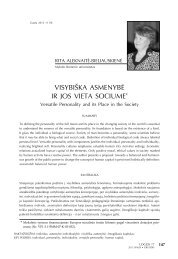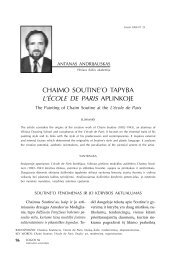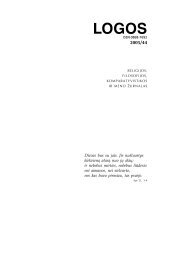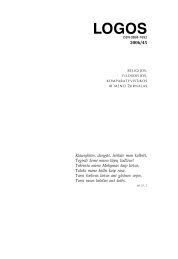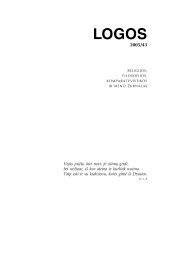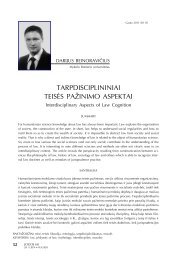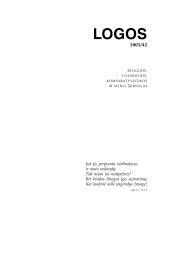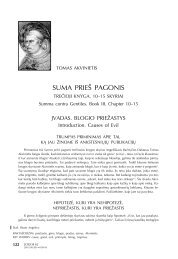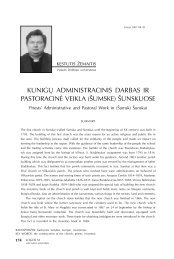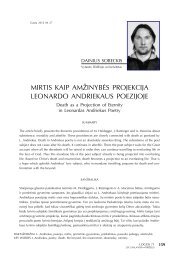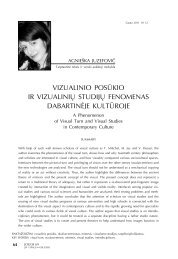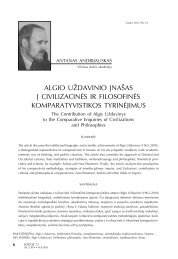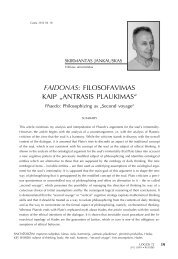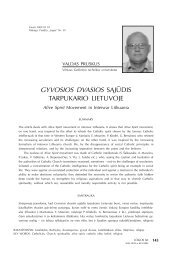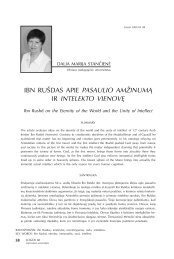Argi papirusas gali augti ten, kur nėra pelkių? Argi nendrės ... - Logos
Argi papirusas gali augti ten, kur nėra pelkių? Argi nendrės ... - Logos
Argi papirusas gali augti ten, kur nėra pelkių? Argi nendrės ... - Logos
You also want an ePaper? Increase the reach of your titles
YUMPU automatically turns print PDFs into web optimized ePapers that Google loves.
Gauta 2002-10-15<br />
Tæsinys. Pradþia „<strong>Logos</strong>“ Nr. 29<br />
LORETA ANILIONYTË<br />
Vilniaus pedagoginis universitetas<br />
MOKSLINË MINTIS<br />
NAUJØJØ AMÞIØ ETIKOS EMPIRISTINËS<br />
IR METAFIZINËS ORIENTACIJOS<br />
Empiricist and Metaphysical Orientations in the Ethics of the New Age<br />
SUMMARY<br />
In this part of the article, the author considers the ethical concept of Bernard Mandeville, who continues<br />
the empiricist tradition of New Age ethics. He treats man as an egotistic being and makes him the<br />
principle of ethical inquiries. His thesis that “private vices are public benefits” could be regarded as a<br />
motto of his doctrine. That thesis is explained on the basis of Mandeville’s famous work “Fable on<br />
Bees”. The paradoxical nature of this work is analyzed against the background of its social environment.<br />
Its future influence on political economy and utilitarian ethics is also discussed.<br />
Kodël niurna avilys<br />
Bernardas de Mandeville’is gana<br />
daþnai mums iðkyla tiesiog kaip „anglø<br />
raðytojas“, <strong>kur</strong>is iðgarsëjo savo Pasakëèia<br />
apie bites. Taèiau tai nereiðkia, kad svarbi<br />
tik meninë ðio kûrinio vertë, o pats jos<br />
autorius laikytinas literatu ar poetu.<br />
Mandeville’is neabejojamai buvo filosofas<br />
(beje, apgynæs ir filosofijos daktaro<br />
BERNARDO DE MANDEVILLE’IO<br />
TURTINGAS NEDORØ BIÈIØ AVILYS<br />
disertacijà „Filosofiniai samprotavimai<br />
apie neprotingø bûtybiø veiksmus“, <strong>kur</strong>ioje<br />
jis árodinëjo, kad gyvûnams bûdingas<br />
elgesio automatizmas), o „raðytoju“<br />
jis vadinamas todël, kad ta sritis, <strong>kur</strong>iai<br />
jis nusipelnë, yra ganëtinai neapibrëþta.<br />
Bendriausia prasme jo kûryba priskirtina<br />
socialinei filosofijai, taèiau pastarosios<br />
aiðkesnës diferenciacijos á atskiras<br />
RAKTAÞODÞIAI. Etika, empirizmas, racionalizmas, naujøjø amþiø filosofija, B. Mandeville’is.<br />
KEY WORDS. Ethics, empiricism, rationalism, New Age philosophy, Mandeville.<br />
LOGOS 34<br />
2003 LIEPA • RUGSËJIS<br />
49



